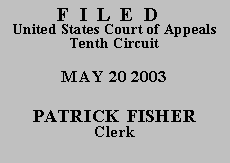

| JAMES JOSEPH OWENS-EL, |
|
| v. |
|
| WARDEN SURGURE, FEDERAL TRANSFER CENTER, |
Mr. James Joseph Owens-El, a federal prisoner appearing pro se, appeals the district court's dismissal of his application for writ of habeas corpus under 28 U.S.C. § 2241. Mr. Owens-El filed a § 2241 application in the United States District Court for the Western District of Oklahoma, challenging a sentence imposed by the United States District Court for the Central District of California. The matter was referred to a magistrate judge, who recommended dismissal for lack of jurisdiction. The district court adopted the magistrate judge's report and dismissed the application.
In his report the magistrate judge cited Bradshaw v. Story, 86 F.3d 164, 166 (10th Cir. 1996), for the proposition that a "§ 2241 [application] attacks the execution of a sentence rather than its validity and must be filed in [the] district in which [the] prisoner is confined." Report and Recommendation at 2. Since Mr. Owens-El was confined at the United States Penitentiary in Florence, Colorado, when he filed his application, the magistrate judge reasoned, he should have filed in Colorado, not Oklahoma. The magistrate judge further ruled that even if Mr. Owens-El's application could be construed as an attack on his conviction under 28 U.S.C. § 2255, the Oklahoma filing would still be improper because, according to Bradshaw, 86 F.3d at 166, such an application would have to have been filed in the Central District of California, where the sentence was imposed. Thus, the magistrate judge concluded, the Western District of Oklahoma did not have the authority to review Mr. Owens-El's application, whether it arises under § 2241 or § 2255.
On appeal Mr. Owens-El challenges the district court's dismissal on two grounds. First, he says that he in fact filed an application with the Oklahoma District Court during his stay at a federal transfer center in Oklahoma City. He says that the filing was not recorded because a clerk intentionally and fraudulently concealed his application. Second, he appears to argue that notwithstanding the place-of-filing rules, the Oklahoma District Court was required to accept his application because (1) the District of Columbia Circuit Court of Appeals directed him to file an application in the district of his confinement after denying him relief in an earlier proceeding, (2) he attempted to file in accordance with that direction, and (3) the Western District of Oklahoma must follow the direction of superior courts like the District of Columbia Circuit.
We review de novo a district court's dismissal of an application for a writ of habeas corpus under § 2241. See Bradshaw, 86 F.3d at 166. We affirm.
As for Mr. Owens-El's first argument--that an Oklahoma court clerk fraudulently concealed his application--we have carefully reviewed Mr. Owens-El's almost incomprehensible pleadings in district court, and we have not found any reference to misconduct by a court clerk. Because Mr. Owen-El's argument was not raised below, we will not address it here. See King v. United States, 301 F.3d 1270, 1274 (10th Cir. 2002) (As a general rule, "this court will not consider an issue on appeal that was not raised below.").
Mr. Owens-El's second argument--that the district court was required to hear his case because the District of Columbia Circuit essentially ordered it to do so--is without merit. The order that Mr. Owens-El references in support of this argument does not direct any action; it merely states: "The avenue for the relief sought here is [an application] for writ of habeas corpus before a court in the jurisdiction in which [the applicant] is confined." In re James Joseph Owens, No. 02-5221 (D.C. Cir. Sept. 20, 2002) (order denying petition for writ of mandamus). In the district court Mr. Owens-El filed an unsuccessful application to proceed without prepayment of fees. Mr. Owens-El has renewed that request on appeal. Because Mr. Owens-El has failed to show "a reasoned, nonfrivolous argument on the law and facts in support of the issues raised on appeal," DeBardeleben v. Quinlan, 937 F.2d 502, 505 (10th Cir. 1991), we deny the request.
For substantially the same reasons set forth in the magistrate judge's Report and Recommendation, adopted by the district court in its Order of December 23, 2002, we AFFIRM. Mr. Owens-El's application for a certificate of appealability
is denied because such a certificate is unnecessary to appeal the denial of a
§ 2241 petition.
ENTERED FOR THE COURT
Harris L Hartz
Circuit Judge